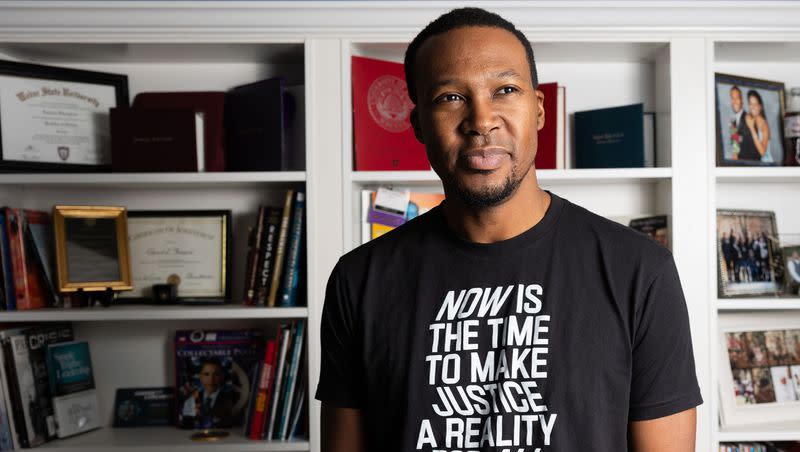Eddy Thompson Jr. knows the power of perspective, and building bridges

- Oops!Something went wrong.Please try again later.
At the time, Eddy Thompson wasn’t crazy about the idea.
He was just a kid, growing up in Layton. It was summertime. Time to play, hang with friends, chill, repeat.
But his mother, she had different ideas.
She assigned him books to read and write book reports on them.
And they weren’t comic books.
* * *
Now, at 43, with three children of his own, Eddy looks back at those book reports, and the mother who assigned them, with a completely different point of view.
Turns out, Jackie Thompson wasn’t insane after all.
“I wasn’t that excited to do it at the time,” says Eddy, “but as time has gone on I’ve understood what she was doing. She was helping me understand who I was as a person and what I could become. She connected me to my roots and that empowered me.”
The books had a common theme: African American history and culture. Eddy read authors like James Baldwin and Martin Luther King Jr., men who explained the Black person’s place in American history in unflinching terms. He read the “Black Americans of Achievement’’ series, learning about accomplished, and yet little-known, African Americans such as the poet Langston Hughes, the actor Paul Robeson and the explorer Matthew Henson. Books that remain on his bookshelf to this day.
“My mom was giving me an education that I wasn’t quite getting in school,” says Eddy. “We had full semesters of Utah history, and I was a history buff, but when it came to Black history it wasn’t quite the same. We’re talking maybe three pages in the textbook.”
Gaining an appreciation for his place in society, Eddy says, made a huge difference in his outlook on life. It gave him the perspective that we’re all part of the same human family and should treat one another accordingly.
His parents — both his mother Jacqueline and his father Edward Thompson Sr. — instilled in their son a love of learning — inside and outside the classroom.
Education is what brought Ed and Jackie together at Idaho State University in the first place. She was on an academic scholarship and he was on an athletic scholarship (Ed was a 6-foot-4 starting point guard on what is considered the best basketball team in school history, the 1977 squad that went 25-5 and made it to the NCAA Elite Eight, beating UCLA in the process).
In 1985, with 5-year-old Eddy Jr. in tow, the Thompsons moved to Layton, where Ed established himself as a civilian contract provider for Hill Air Force Base and a youth basketball coach while Jackie kept going to school. She got a master’s degree at Weber State and a Ph.D. in education at Utah State. Civil rights and gender equality were her clarion causes throughout a career of bridge-building that included serving as director of education equity for the Davis School District from 2000 until she retired in 2017 (this past summer, Dr. Jackie was awarded an honorary doctorate from the University of Utah, recognized for being a “leader of statewide multicultural and diversity initiatives”).
“My parents are stalwarts,” says Eddy.
He has taken up their baton to educate and advocate for human rights. Six years ago, Eddy was appointed to the state of Utah’s Martin Luther King Jr. Human Rights Commission, bringing youthful energy to the volunteer group that was instigated by Gov. Norm Bangerter in 1991.
The commission’s cause, explains Eddy, is to “get Dr. King’s message out and bring people together.” They meet and hold events year-round, with special emphasis every year on Martin Luther King Jr. Day.
This year’s MLK Day is this coming Monday, Jan. 15. If you happen to be at the Utah Jazz-Indiana Pacers game that night and see a young-looking man surrounded by even younger people, that’ll be Eddy. He’s in charge of the MLK Commission’s Youth Day, an event sponsored annually by the Jazz that introduces local youth to a variety of “Dr. King specific activities” — in addition to being the Jazz’s guests at the game.
For Eddy, it’s another opportunity to remove stereotypes and bring us all together regardless of the color of our skin. He knows this is just one step in the process; that there’s work to do and prejudices won’t go away in a night. He’s seen his share of discrimination and what he calls “micro-aggression.” He knows Layton, Utah, like everywhere else, isn’t immune to racism.
“I’ve seen plenty of people that are angry, for good reasons; I’ve seen plenty of people that are frustrated, and I understand that,” he says, “But at the end of the day, if we can draw people in to our cause and get them excited about seeing each other’s perspective and learning from that, we’re all going to be better off.”
Instead of surrendering or becoming bitter, he’s chosen to, like his mom, educate and build bridges.

